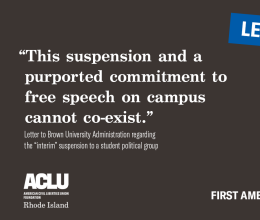The ACLU of Rhode Island today announced the favorable settlement of its lawsuit on behalf of ACI inmate Wesley Spratt, who since 2003 had been barred by the Department of Corrections from preaching during Christian religious services at the state prison. Spratt had been preaching at ACI services for seven years before he was unilaterally stopped from doing so based on vague and generalized “security” concerns. A federal district judge initially upheld the ban, but in April the U.S. Court of Appeals for the First Circuit reversed that ruling and ordered a trial on the merits of the case. The settlement obviates the need for a trial.
In challenging the ban, RI ACLU volunteer attorney Lynette Labinger had argued that the preaching ban violated a federal law designed to protect the religious freedom of institutionalized persons. That law, known by its acronym RLUIPA, bars states from imposing any substantial burden on an inmate’s exercise of religion unless it furthers a compelling interest and is the least restrictive means available.
A consent judgment (link to settlement) entered by U.S. District Judge William Smith today supports those arguments, concluding that DOC’s “policy of blanket prohibition against all preaching by inmates substantially burdened [Spratt’s] rights under RLUIPA,” and was not “the least restrictive means available to achieve its compelling interest in maintaining prison security.” A separate settlement agreement entered between the parties notes that the DOC has adopted a new policy that specifically authorizes inmates to conduct religious sermons under the direction of an institutional chaplain. The settlement agreement further provides that the DOC will pay the plaintiff’s attorneys’ fees.
Spratt, who considers his preaching a “calling” from God, had been preaching at religious services on a weekly basis under the supervision, and with the support, of clergy at the ACI. The DOC provided no evidence of security problems during, or as the result of, his supervised preaching during the seven years he had been doing so. Nonetheless, Spratt was ordered to stop preaching when a new warden took over the maximum security facility in 2003.
ACLU attorney Labinger said today: “The ACLU is very pleased with the settlement reached in this case, which allows Mr. Spratt to resume his preaching at the ACI. I commend the Department of Corrections for its work in adopting a policy designed to fulfill the letter and spirit of both the First Circuit’s ruling and RLUIPA’s goal of respecting the exercise of religious freedom by incarcerated individuals.”







